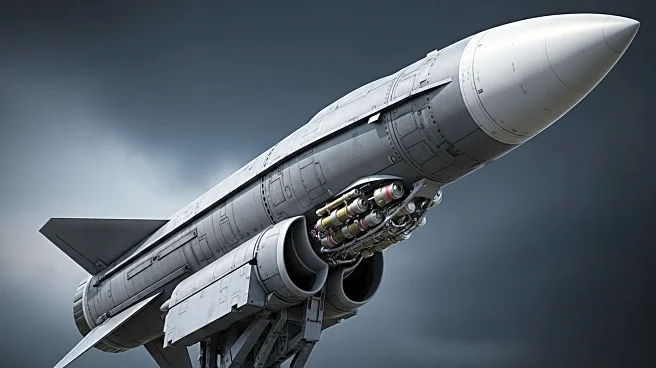What is the story about?
What's Happening?
Ukraine has reported the discovery of Western-made components in Russian missiles and drones used in recent attacks. According to a statement from Ukrainian President Volodymyr Zelenskyy's office, Russia launched 549 drones and missiles into Ukraine, containing over 100,000 foreign-made parts. These components were sourced from companies in the US, UK, Germany, South Korea, Japan, Taiwan, and other countries. The attacks, which have intensified in recent weeks, targeted various regions, including Lviv. The Ukrainian government highlighted the presence of UK-manufactured microcomputers in Russian drones and US converters in missiles. This revelation comes despite international sanctions aimed at curbing Russia's military capabilities.
Why It's Important?
The presence of Western components in Russian military equipment raises significant concerns about the effectiveness of international sanctions. These findings suggest that Russia is still able to procure critical parts from Western countries, potentially undermining efforts to limit its military operations. The situation highlights the need for more stringent enforcement of export controls and international cooperation to close loopholes in the sanctions regime. The continued supply of these components could prolong the conflict, affecting regional stability and international relations. Stakeholders, including governments and companies, may face increased pressure to ensure compliance with sanctions and prevent the flow of military-grade components to Russia.
What's Next?
Ukraine is calling for a coordinated response from the G7 and other international partners to address the issue of component supply to Russia. This may involve tightening export controls and enhancing monitoring mechanisms to prevent the circumvention of sanctions. The international community is likely to scrutinize the supply chains of companies involved in the production of these components. Further diplomatic efforts may be necessary to ensure that countries implicated in the supply of these parts take appropriate action. The situation could lead to increased diplomatic tensions and calls for more comprehensive sanctions against Russia.
Beyond the Headlines
The discovery of Western components in Russian military equipment underscores the complexities of global supply chains and the challenges of enforcing sanctions in a highly interconnected world. It raises ethical questions about corporate responsibility and the role of businesses in conflict zones. Companies may need to reassess their supply chain practices to ensure they are not inadvertently contributing to military conflicts. This situation also highlights the potential for technological proliferation, where advanced technologies can be repurposed for military use, complicating efforts to control their distribution.















